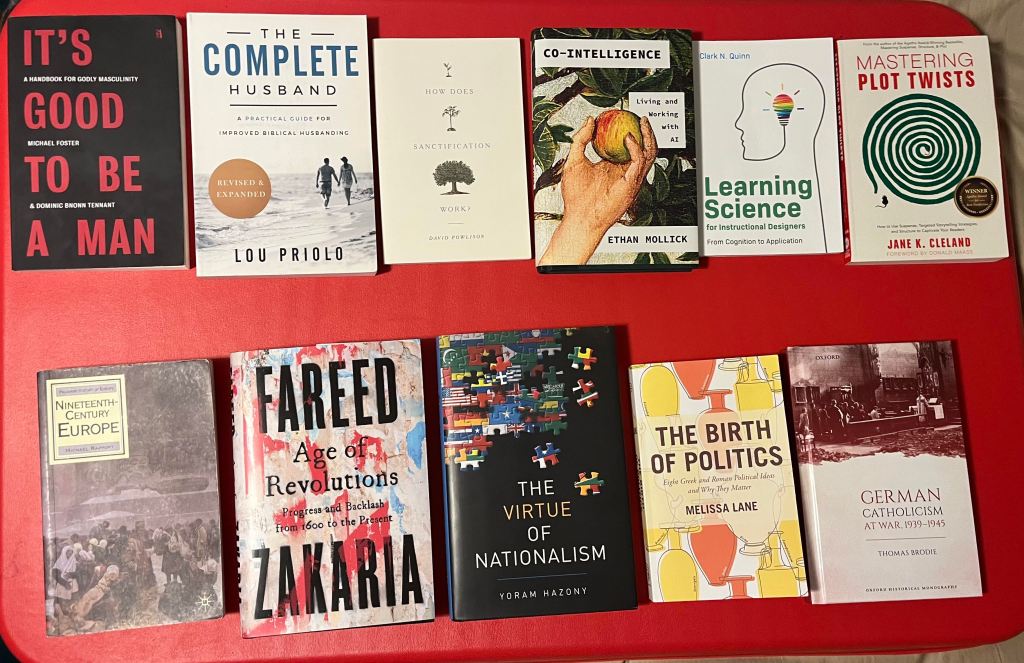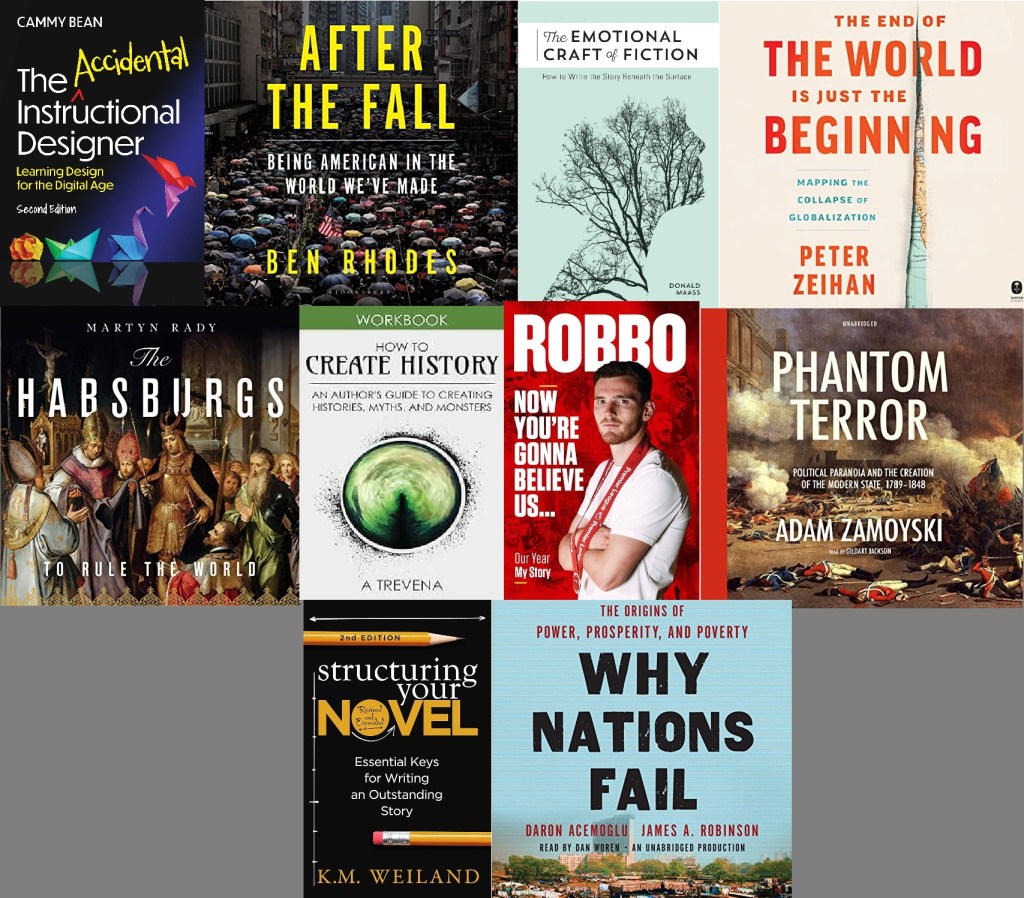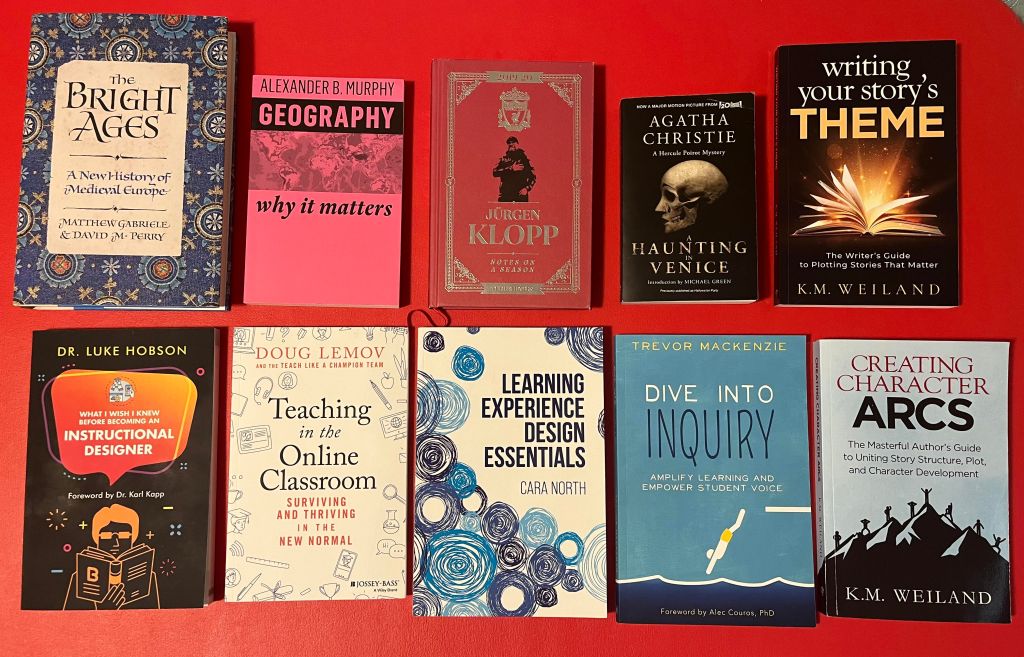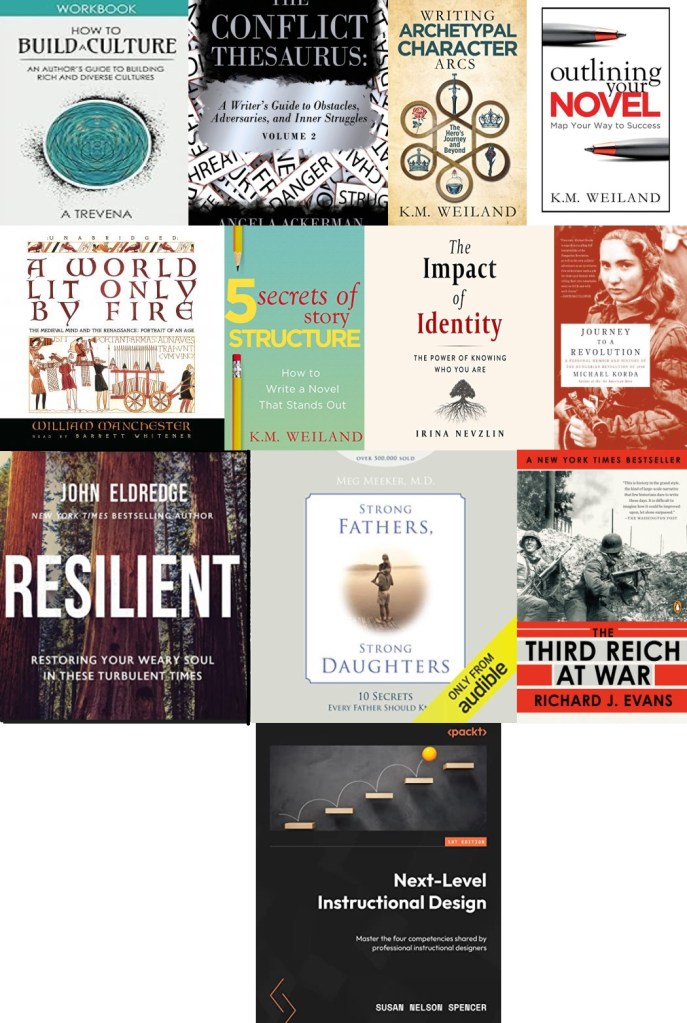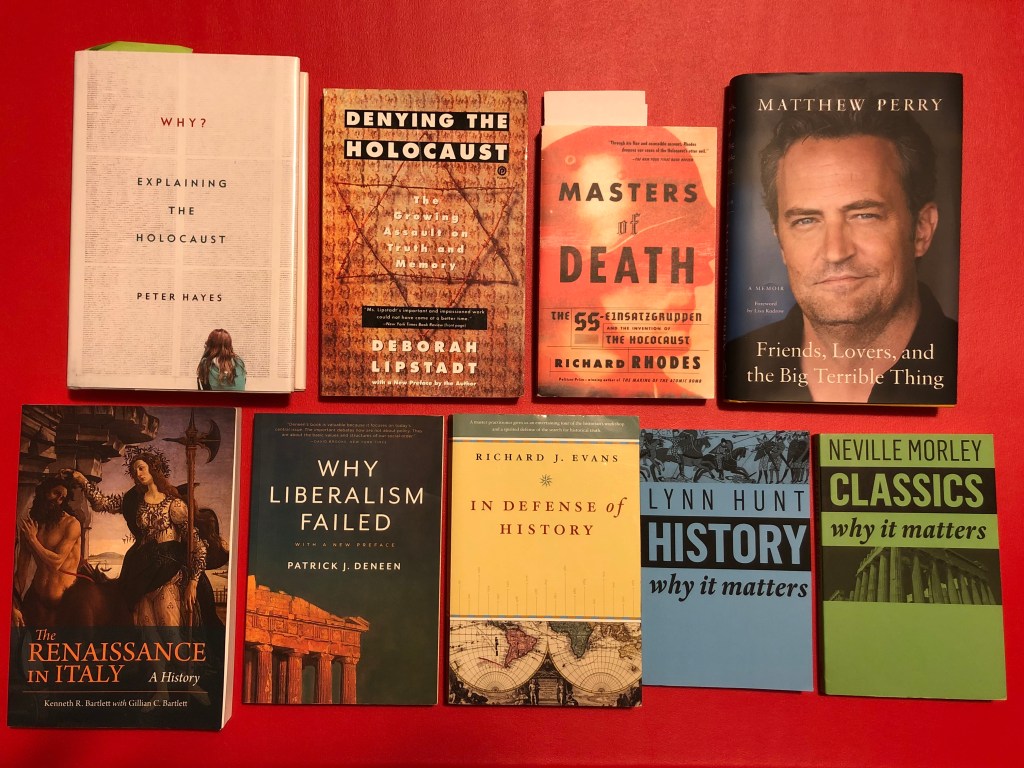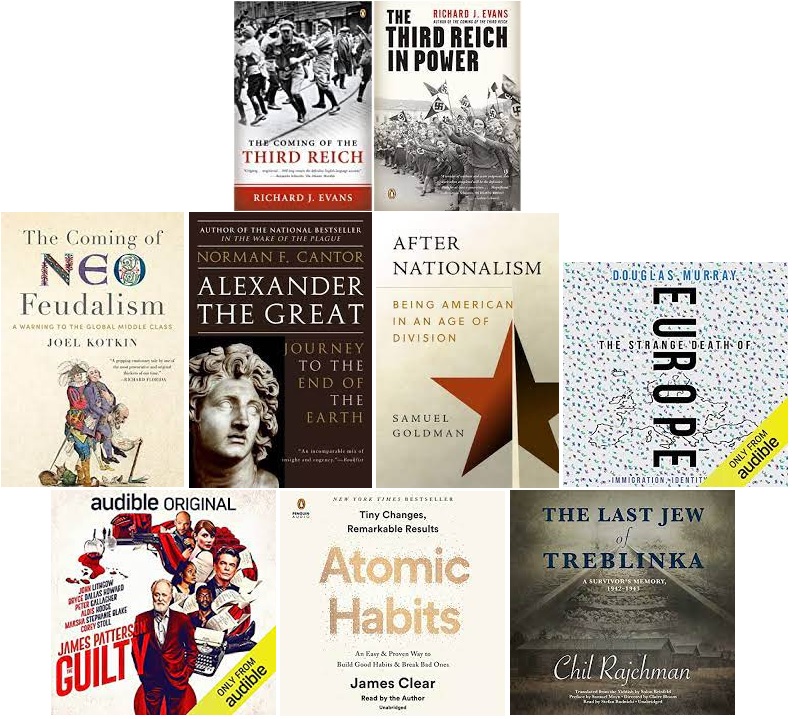Welcome to 2026! It’s hard to believe it’s been a year since I blogged, but life has been happening and I’ve been busy living it. I hope this post finds you healthy and happy and ready to tackle whatever 2026 brings. I have a few fun tidbits to share with you below, so let’s dive on in. I’ll begin with my annual reading list:


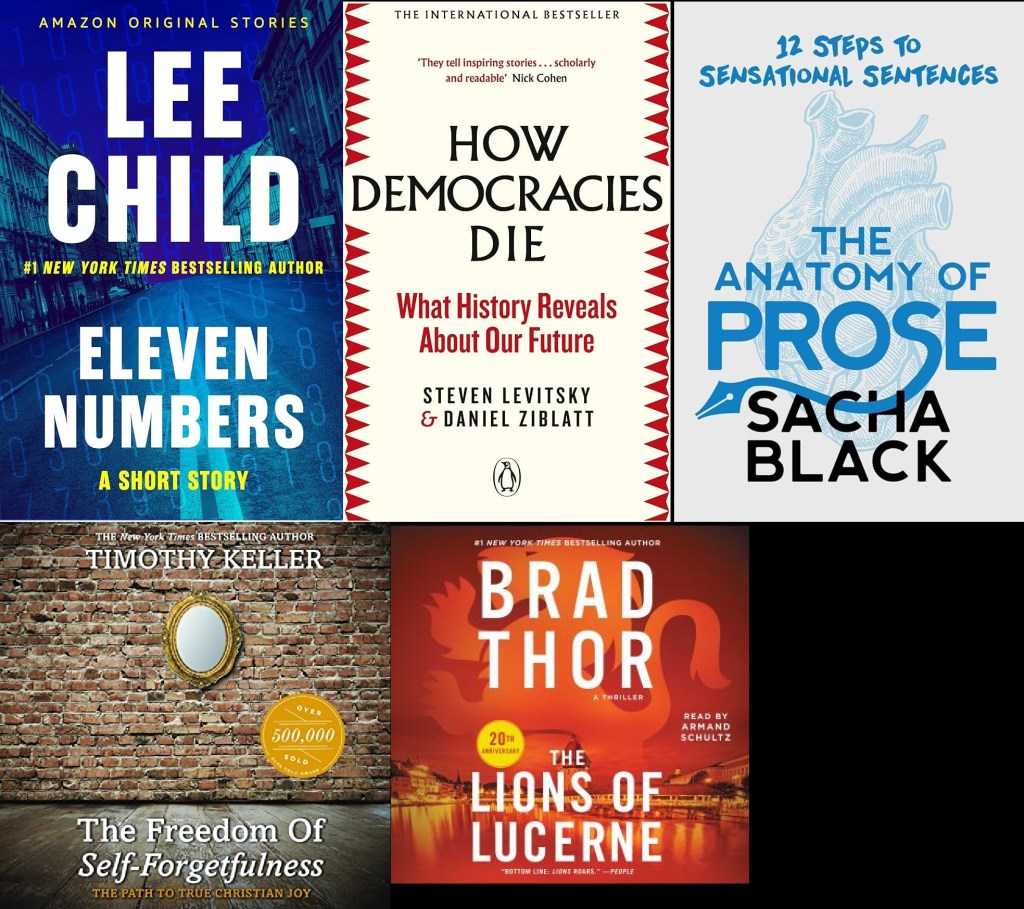
Like last year’s post, I won’t get deep into the details on all the books; instead, in no particular order, I’ll address a few of the more notable or impactful titles in my opinion…
First, I read seven books relating to instructional design and higher education more broadly, and I’m happy to say that I either learned new things or finished reading with a number of key takeaways that I could apply to my job. The books Creating Engaging Discussions, Best Practices in Engaging Online Learners through Active and Experiential Learning Strategies, and Make It Stick: The Science of Successful Learning stuck out to me the most because I was able to immediately incorporate a good deal of tips, tricks, and practices into how I design online courses at the university level. As I mentioned in my New Year’s 2025 post, the reading I do for my job has morphed into more of an ongoing effort at more clearly understanding how to do my job better than I did yesterday, or three months ago, or even two years ago when I started at the University of Jamestown. The book Teaching with AI was also enlightening here or reaffirming there, but also worrisome at other times. My design team read through that one together over the fall semester and will debrief when we return from Christmas break after the New Year, so I don’t have anything to report on that at this time. All in all, these books have certainly contributed to bettering me as an instructional designer, and I’d recommend them to anyone aspiring toward that type of work.
Next, I read a handful of writing-related books that were sort of a continuation of my writing-related reading from last year; these include The Anatomy of Genres, The Anatomy of Story, and Next Level Plot Structure. I have become a true fan of KM Weiland’s work on story development, including plot structure, theme, and character arcs/development, which I’m excited to say has all been the driving force (or at least a big part of it) behind the start of my next writing project (more on this below). Genres andStory are both authored by John Truby, who does a wonderful job of breaking down the unseen structures of storytelling; I found these books in a search related to the Plot Structure book, authored by KM Weiland, who has unknowingly become my story development muse, guiding me along the path of improving my storytelling. I also listened to The Lions of Lucerne by Brad Thor on Audible in an effort to analyze fictional work through the lens of Weiland’s theories and principles; and The Displaced by Viet Thanh Nguyen also served as a “research reading” on the one hand, but also as something I wanted to read in general anyway on the other.
Next, a few faith-related books were refreshing and rejuvenating for my soul in this season of my life; these include Habits of the Household and Family Shepherds. These two books in particular really spoke to me, with clear application and meaning behind their words. Habits was authored by Justin Whitmel Earley and proved an enlightening read with clear steps on forming habits rooted in scripture that are intended to bring better harmony to our everyday life. Shepherds was authored by Voddie Baucham Jr. and highlights the important role that fathers play in shepherding their kids (and wives) toward Christ and God. For any believing fathers out there, especially with younger kids, I’m sure you’d find both of these books helpful and inspiring.
Next, I started reading through The Hobbit with my oldest son, Everett, this summer; after completing the book, we watched through all three films in Peter Jackson’s trilogy. We then started into The Fellowship of the Ring and finished it before Thanksgiving. At the time of this posting, we’re just over halfway through The Two Towers and will continue on into The Return of the King — with the intention of watching straight through the Lords of the Rings trilogy when we’re done. These books (and films, for that matter) were such a part of my formative years developmentally but also from the standpoint of storytelling, so reading these with Everett has been a treat.
Lastly, a few books on history, politics, international relations, and society/culture made the list this year; these include How Democracies Die, Surviving Autocracy, and The New Class War. All of these speak to politics in some way, but also draw on other disciplines (history among them) to illuminate issues that characterize our present moment. Democracies, authored by Levitsky and Ziblatt, illustrates how democracies across space and time (but mostly in the modern era) can and have crumbled under various sorts of pressures and catalysts, and offers a warning for the future; Autocracy by Gessen looks at the political developments leading up to the early pandemic (though not necessarily associated directly with it); and New Class War by Lind explores the idea that Western democracies are being torn apart by a new class war, contrasting elites in high-income, urban “hubs” with the social and economic interests of traditionally lower-income, rural “heartlands.”
Here are all the books I read listed out for those interested:
- The Anatomy of Genres by John Truby
- The Anatomy of Prose by Sacha Black
- The Anatomy of Story by John Truby
- Best Practices in Engaging Online Learners Through Active and Experiential Learning Strategies (2e) by Budhai and Skipwith
- Creating Engaging Discussions: Strategies for “Avoiding Crickets” in Any Size Classroom and Online by Herman and Nilson
- Design for How People Learn by Julie Dirksen
- The Displaced by Viet Thanh Nguyen
- Eleven Numbers by Lee Child
- Family Shepherds: Calling and Equipping Men to Lead Their Homes by Voddie Baucham Jr.
- The Fellowship of the Ring by J.R.R. Tolkien
- The Freedom of Self-Forgetfulness: The Path to True Christian Joy by Tim Keller
- Habits of the Household: Practicing the Story of God in Everyday Family Rhythms by Justin Whitmel Earley
- The Hobbit by J.R.R. Tolkien
- How Democracies Die by Levitsky and Ziblatt
- Integrating Differentiated Instruction & Understanding by Design: Connecting Content and Kids by Tomlinson and McTighe
- The Lions of Lucerne by Brad Thor
- Make It Stick: The Science of Successful Learning by Brown, Roediger, and McDaniel
- The New Class War by Michael Lind
- Next Level Plot Structure: How to Write a Better Novel Using Advanced Storytelling Techniques by KM Weiland
- Praying Like Monks, Living Like Fools: An Invitation to the Wonder and Mystery of Prayer by Tyler Staton
- The Ruthless Elimination of Hurry: How to Stay Emotionally Healthy and Spiritually Alive in the Chaos of the Modern World by John Mark Comer
- Surviving Autocracy by Masha Gessen
- Teaching with AI: A Practical Guide to a New Era of Human Learning by Bowen and Watson
- UDL in the Cloud!: How to Design and Deliver Online Education Using Universal Design for Learning (Udl Now!) by Novak and Thibodeau
Professional News
My work as an instructional designer has kept me busy this year. I don’t know how many course designs, copies, and reviews I did, but it was a lot. Thankfully, I’ve settled into my role more and more, and I’ve had a supportive team alongside me the whole way. An exciting development of recent weeks is that I was given the green light to propose a general education history course for our online program at the University of Jamestown; but what’s more, it’s a course on the Holocaust and I’ll be the instructor when it’s offered (hopefully every year)! It’s still somewhat surreal that it’s happening, and I can’t wait to really get into the course design later this spring/summer to get the course ready for delivery in January 2027. I’ll be sure to have updates on it by or before then.
In addition to the Holocaust course at UJ, I’ve been revamping some of my online history courses at Mount Union and will continue to do so into 2026. Part of being an instructional designer is that I am always iterating designs (i.e., improving design components and integrity multiple times over the span of months and years), and the same can be said of the courses I teach at my alma mater. There’s also a potential for me to do some design and instructor work in the Education Department, which could turn into a once- or twice-a-year gig, year after year…but it’s still early for that as well and nothing’s in stone yet, so I’m mentally putting a pin in it for later. All this said, though, most of my spare time over the next year may very well be spent on academic work — with little time left for creative writing. It’s both good and bad, depending on the perspective.
Writing News
It’s crazy that a year has already passed since I published my last novel, The Ivory Obelisk! I had a blast writing that story and bringing that book to market, and I’m so grateful for the warm reception it’s initially received. If you haven’t yet checked it out, feel free to click the link above!
I mentioned in my last blog post that my next writing project is more audacious in scope and vision compared to my previous work, and that it’s being developed around an idea that I had way back in high school. It’s still very much early on in the process, but a new tidbit I can share here — mostly because I’ve already said it verbally to some people here and there — is that it’s actually a 4-book series (tetralogy), with the first book acting as a primer of sorts leading into the “main event” of the remaining trilogy of books. I mentioned earlier in this post that I’ve been incorporating KM Weiland’s techniques and principles into this new project; it’s been exhilarating to start this project from scratch through the lens of Weiland’s work, with a lot of the early planning feeling solid and stable enough to support further story development. Because of the potential for my 2026 to be filled with academic-related work, I’m not sure I’ll make a big enough chunk of progress to warrant new updates in the coming months. But when that time comes, I’ll be sure to have some news ready for you.
Family News
The kids have been growing into their personalities individually but also together as a sibling group, which has been fun to experience. Though some days they’re loud and don’t always listen, they also have sweet moments of kindness and compassion that far outweigh those other times. We’ve been here, there, and everywhere for various things: from vacation in the Great Smokies to an anniversary trip to Michigan City, IN…from moving my in-laws into a new house to attending my nephew’s wedding…from spending Thanksgiving with extended family to going on our usual Saturday morning breakfast run with just us…from school events to lazy days around the house…it’s all been part of a wonderful year of growing as a family. We’re also on the cusp of no longer buying diapers/pull-ups and having everyone potty trained, so that’s a victory in and of itself.
That’s it for right now. Hopefully my year won’t be as busy and I can publish some blog posts at the usual quarter marks in April, July, and October, but we’ll have to wait and see. Thank you all for reading and following along with me on my journey as a writer, as an educator, and as a person. I hope your 2026 is off to a great start and that things go your way in life, work, and play!
Until next time,
Mike/”Eli”
